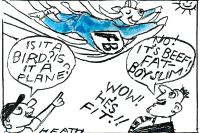That we will encounter more difficulties and anxious moments in the days ahead is certain,’ Mr Tony Blair, the Prime Minister, said in the Commons after four days of war against Iraq, ‘but no less certain, indeed more so, is coalition victory.’ On the seventh day of the war he flew, with Mr Jack Straw, the Foreign Secretary, to the United States for talks with President George Bush and Mr Kofi Annan, the secretary-general of the United Nations. RAF Tornados attacked radar systems around Baghdad, and B52 bombers based at Fairford, Gloucestershire, flew nightly sorties to release computer-guided missiles against targets in Iraq. Television viewers were able to see powerful explosions in Baghdad; in one night 300 cruise missiles hit the city, although its public lighting continued to work and civilian casualties were remarkably low – Iraqi sources said on the third day that three civilians had been killed and 200 wounded, but by the fifth day put the number of civilian dead at 150.

Get Britain's best politics newsletters
Register to get The Spectator's insight and opinion straight to your inbox. You can then read two free articles each week.
Already a subscriber? Log in





Comments
Join the debate for just £1 a month
Be part of the conversation with other Spectator readers by getting your first three months for £3.
UNLOCK ACCESS Just £1 a monthAlready a subscriber? Log in